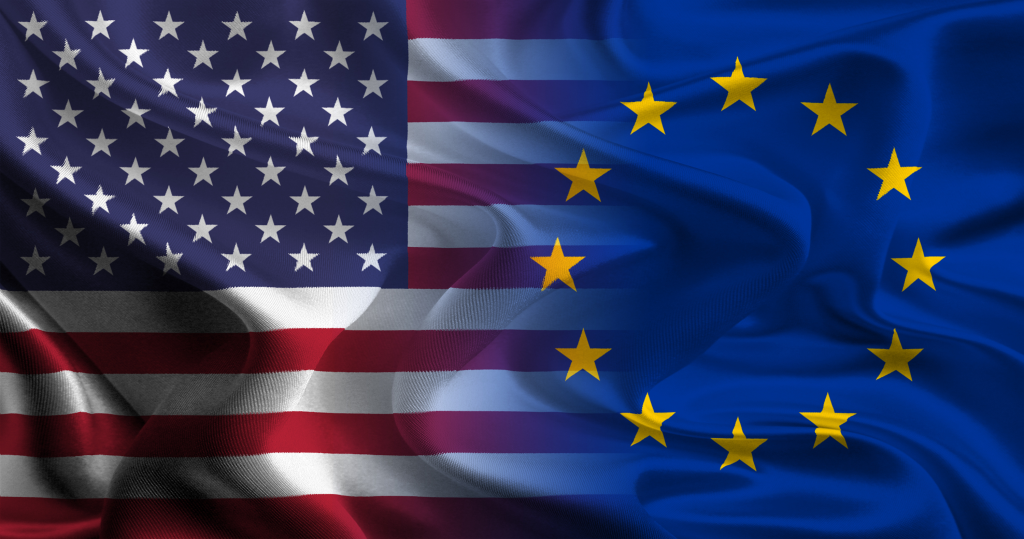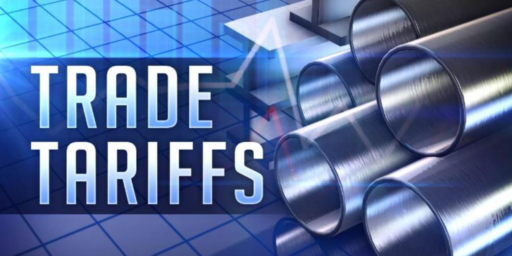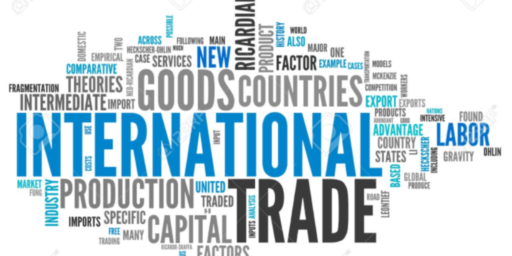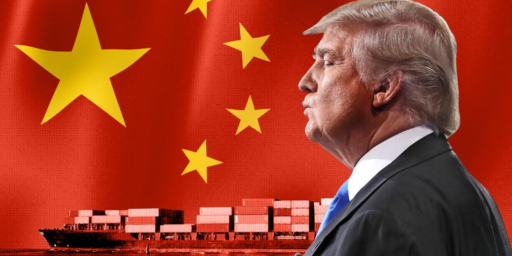That U.S.-E.U. Trade War Truce Is Less Than Meets The Eye
President Trump and the President of the European Commission announced an agreement late yesterday on trade issues, but it's long on promises and short on results.

Late yesterday, in a surprise announcement in the White House Rose Garden. President Trump and Jean-Claude Juncker, the President of the European Commission, announced an agreement that both sides are hailing as a major step to avoid what seemed like it was about to develop into a trade war between two of the world’s biggest economies:
WASHINGTON — The United States and the European Union stepped back from the brink of a trade war on Wednesday, after President Trump said the Europeans agreed to work toward lower tariffs and other trade barriers, and to buy billions of dollars of American soybeans and natural gas.
The surprise announcement, made by Mr. Trump and the president of the European Commission, Jean-Claude Juncker, defused, for the moment, a trade battle that began with Mr. Trump’s tariffs on steel and aluminum exports and threatened to escalate to automobiles.
“We’re starting the negotiation right now, but we know very much where it’s going,” Mr. Trump said, standing next to Mr. Juncker at a hastily scheduled appearance in the White House Rose Garden.
Mr. Juncker said, “I had the intention to make a deal today, and we have made a deal today.”
The two sides, he said, had agreed to hold off on further tariffs, and work toward dropping the existing ones on steel and aluminum, while they tried to work out a deal to eliminate tariffs, nontariff barriers and subsidies on industrial goods, excluding autos.
It was hard to say, given Mr. Trump’s bluster and unpredictable negotiating style, if the agreement was a genuine truce or merely a lull in a conflict that could flare up again. Twice, Mr. Trump’s aides have negotiated potential deals with China, only to have him reject them and impose further tariffs. Cutting these trade barriers to zero would be an extraordinarily complex political challenge on both sides of the Atlantic.
And Mr. Trump stepped back from punitive tariff threats for some relatively minor European concessions: the purchase of soybeans to make up for a steep falloff of buying by China, and the promise to purchase liquefied natural gas once the United States builds more export terminals, which are far away. For weeks, the president has portrayed the European Union as fleecing America with unfair trade, but he put away his saber as farm state Republicans were begging for relief.
“I think it’s helpful that they made some progress today with the European Union, and I think we really emphasized that we need to keep the momentum up and get the deals as soon as we can,” said Senator John Hoeven, Republican of North Dakota, who was at the White House for the announcement.
Europe’s pledge to buy more natural gas gives Mr. Trump a talking point with Russia, after he vowed to compete for orders in Europe, where Russia is the largest supplier. The lack of natural gas terminals, though, means that this windfall is years in the future.
Still, Mr. Trump called it “a new phase in the relationship between the United States and the European Union,” a striking change in tone from his recent trip to Europe, when he referred to the European Union as a “foe” and criticized its most important member, Germany, for its dependence on Russian gas.
(…)
The Trump administration has already imposed billions of dollars of tariffs on the European Union for what it has labeled unfair trade practices, raising costs for companies and consumers and roiling a traditionally close alliance. Mr. Trump’s threat to go after automobiles particularly rattled the Germans, who export millions of BMWs and Mercedes-Benzes to the United States but also produce millions at American factories.
Mr. Juncker was dispatched to Washington this week along with other European officials as part of a last-ditch effort to halt those tariffs. A former prime minister of Luxembourg known for his informal manner and occasional gaffes, Mr. Juncker has forged a good rapport with Mr. Trump, and the two men appeared at ease on Wednesday.
“Disaster avoided,” said Bart Oosterveld, the director of the global business and economics program at the Atlantic Council. “Earlier today, our highest hopes were for a truce, and this is kind of like a truce.”
Fred Bergsten, senior fellow and director emeritus of the Peterson Institute for International Economics, said an agreement with Europe would allow Mr. Trump to focus on China. But he said that the deal seemed to have an “eerie similarity” to one with China this year, shortly before Treasury Secretary Steven Mnuchin announced that the trade war was “on hold.”
“We have seen something like this movie on the other major trade front only a couple of months ago, and I would just hope that it would not play out in the same way, which at the moment seems to be a stalemate with China,” Mr. Bergsten said.
It’s important to take a step back from yesterday’s announcement and recognize what this announcement actually means in the real world. This agreement that Trump and Juncker reached, for example, will not lead to a lessening of tariffs or other trade restrictions imposed by the United States or the European Union. It also doesn’t mean that either the tariffs that the President imposed on steel and aluminum from the European Union or the retaliatory tariffs that the E.U. placed on American products including denim, motorcycles, bourbon, and other products, will be lifted any time soon. It also doesn’t mean that the other agreements that the two men alluded to in their announcement yesterday, such as the European commitment to buy more natural gas from the United States, will go into effect. So far at least, these are all goals rather than actual accomplishments. Instead, all we really have right now is an agreement by the parties to engage in further negotiations regarding these issues with the goal of coming up with some sort of comprehensive agreement that accomplishes these goals. In the meantime, the parties have agreed, at least for now, to hold off on additional tariffs while they try to negotiate a broader agreement. While this is a positive development, it’s hardly the end of the process.
As the article quoted above notes, we’ve been here before as recently as this year. Twice already, President Trump’s trade representatives have reached what they thought was an agreement with China to avert what could still devolve into a disastrous trade war between the world’s two largest economies. Twice the President rejected the deal his own negotiators had reached and instead turned around and increased tariffs on Chinese goods, a move which of course has caused China to impose retaliatory tariffs that are already having an impact on areas such as American agriculture. As Steven Erlanger notes in The New York Times, this leaves open the question of whether Europe can trust this President going forward. Additionally, as Heather Long and Steven Mufson note in The Washington Post, it’s way too soon to declare the U.S.-E.U. trade war over. At best, we’ve got a temporary truce with the possibility, or perhaps given the President we’re dealing with her in the United States the probability, that the war could resume full-force at any moment




If I’m Mr. Juncker I’m thinking that we are possibly 100 days away from Trump being gutted like a trout in the mid-terms. Failing that: Mueller. What do you do when you’re ahead on points and see the opposing quarterback has gone lame? You run out the clock.
That’s what I’d do if I were a sober, sensible fellow like Juncker. As just reckless me, I’d escalate by pushing hard for a deal with China. And if I were China I’d escalate by embargoing all electronics sales to the US. The Chinese can buy their soy beans from Brazil. Where do we go to get phones and computers?
Or of course they could just offer Trump a golf course with his name on it and he’d roll over like a needy puppy.
@Michael Reynolds:
Couldn’t China pay off whatever Denny owes Vladimir, thus getting him out from under Putin’s thumb and beneath Xi’s?
He’d end the trade war in exchange for Taiwan, and make Mandarin the official language of the US 😉
Trumpoids are gullible enough to fall for this. After all, if you only have enough faith, you can make the impossible real!!!
As an aside, wouldn’t zero tariffs have a huge impact on many American and European industries? My understanding is that the average tariff is 2% on both American tariffs on European goods and vice versa, but that a number of politically protected products wouldn’t exist if their significantly higher tariffs were removed. (I’m assuming that government subsidies to these industries would also have to go.) Does anyone know more about this?
Eliminating all tariffs in the context of a trade deal is doable. If you can get past things like origin rules and how to figure them, not to mention entrenched special interests.
Eliminating all subsidies is flat-out impossible. Won’t happen. can’t happen. not just in Europe, but in almost every country. Look up all the subsidies the US government hands out.
Besides, what counts as subsidies? Loan guarantees? State investments in companies? Loans?
It’s not a tall order. It’s an impossible one.
“Long on Promises and Short on Results – A Biography of Donald Trump” has a nice ring to it.
Trump needs turmoil, I’m coming to understand. Conflicts, shouting, debates, hidden motives, romantic entanglements, guns and explosion — there has to be a battle each week, just like the TV serials he probably soaked up as a kid in the ’50s, to provide the excitement he has to have just as you or I need to constantly absorb oxygen.
More than physiologically, he needs the drama for fiscal reasons — he’s a big guy, heavyset and tall, the type to shove his opponents around, all the while arguing as fast as his mouth can move. He’s determined, and the confusion doesn’t bother him, so he wins arguments against more flustered folks, he gets concessions and agreements he can proclaim as victories.
Waiting him out is not going to be a successful strategy. Trying to mollify him will never work.
If you’re in a war with Donald Trump — he’s stiffed you for construction work you’ve done, for example — you basically have to bail out. Lay off your employees, sell your assets, call the bankruptcy lawyers, go to church and praise God for life in a Land of Opportunity, keep your mouth shut when the reporters come around. Perhaps the Europeans are bracing themselves for this sort of future but just haven’t reached acceptance.
Alternately, they might war back. Trump’s beyond persuasion, but he’s surrounded by spear carriers who take direction from him — press secretaries, cabinet officials, family, Congressmen, people on television. Disrupt them . Get Harvard classmates to reminesce about stuff Jared said as a drunken party goer. Find the missing billions in a treasury official’s financial disclosure statement. Get on Fox News and throw in references to orgies where Sean Hannity has been a featured guest. Hit ’em all with lawsuits, serious and frivolous. Pile on trade restrictions that hit the Midwest and Plains states like hurricanes. And Oh, Keep Praying. Never let it be forgotten that Europe is the home of Christianity, the sanctified localtion for all who are good and decent and disposed to acty in a Godly manner. Find a not-so-Godly Evanagelical preacher for Anglicans and Catholics to disparage each week.
Keep it up. Make it unpleasant for Trump supporters. Convince them they aren’t just enjoying lead roles in Hogan’s Heroes, they’re the wounded and discarded types shoveled into graves in the final scenes of each week’s Combat. When enough of these folks have come to understand the underlying plot, they’ve start to bail out, and eventually voters can pull the plug on President Trump’s theatrics.
I sure hope.
What
Naive as I might be, but does the EU buy soybeans or do companies within the EU member nations buy soybeans?
And when a company in the EU buys soybeans does the EU commission dictate who they must purchase from?
@Kathy:
We can only hope neither Trump nor Xi reads OTB.
@mike shupp:
People thought I was off my meds when I said Trump is a psychopath:
My bolding of all things that IMO apply to Trump. I don’t know whether he was a problem in childhood, and I don’t think we could call his lifestyle parasitic. But add the scores for the others and you get 14 hits. I give one point on ‘realistic goals,’ and 2 on the others, which gives Trump a score of 27, just three points shy of a psychopathy diagnosis – and we don’t know about his childhood.
The man is a psychopath. He acts like a psychopath, a rather stupid one, but with the full array of psychopath’s powers.
A little tidbit to brighten everyone’s day:
A federal grand jury investigating President Donald Trump’s former personal lawyer Michael Cohen for possible crimes has subpoenaed the chief financial officer of Trump’s company, Allen Weisselberg, to testify, a new report said Thursday.
Weisselberg, after Trump’s election in 2016, was put in charge of the Trump Organization and the president’s assets along with Trump’s sons, Donald Jr. and Eric.
The Journal noted that Weisselberg was once described by a person close to the company as “the most senior person in the organization that’s not a Trump.”
Weisselberg has worked for the Trump org for years, started under Fred Trump and even did Donny’s taxes. CFO’s know where the bodies are buried.
@Michael Reynolds:
Does Dennison even read? I assume Xi does.
@Michael Reynolds:
Add one: behavioral problems in early life. I don’t know what, but most of the kids shipped off to military schools in 1950’s-`1960’s weren’t there as preparation for The Citadel or West Point. I have to assume young Donald was disappointing his parents in same fashion.
@Michael Reynolds:
Incidentally had I taken the test 30 years ago I’d have scored a 26. I’m now down to a disappointingly dull 8. Some blending of age and experience.
Good to see the perpetually angry are alive and well, if still mentally unbalanced. But there are therapists for that.
@Guarneri: It gives me hope to know things have gotten so bad in Trump world that you are basically just phoning it in at this point.
That’s a perfect description of the president’s tweets…stop projecting for him and acknowledge the true source of such nonsense…
@SenyorDave:
It got better. Someone, and Cohen’s people say it wasn’t them, leaked that Cohen can testify that Trump himself knew about the infamous Trump Tower meeting in advance.
@Guarneri:
Oh, dude, so glad you stopped by so that I can tell you that Trump knew of and approved the infamous Trump Tower Meeting. You know how you like to say, “How’s that colluding thing doing? Har har?”
Here’s my answer: AH HAH HA HAH HAH HA HAH.
You know what, Drew? Trump is fcked. Await the panic tweets. What shall they be? Something racist? Something un-American? Something so stupid we all just kind of stare and ask ourselves just how moronic an American would have had to be to vote for this catastrophic failure of a man?
The noose is tightening on your cult leader, Drew. Time to consider a protest self-immolation.
@Guarneri: f
Good to see you weighed in just as your dear leaders personal attorney cut your leaders head off.
The end of Dennison is nigh.
@Just Another Ex-Republican: Indeed!
So basically we’re restarting the TTIP negotiations Trump walked away from at the start of his administration, and all this trade war really accomplished was to change the name of the treaty?
Part of the problem is that on short term the Europeans does not have alternatives do US soy. On the other hand, you just need some months for farmers in Paraguay, Brazil and Argentina to increase their production.